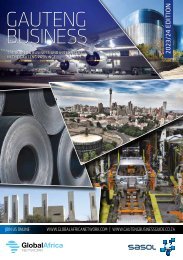South African Business 2019 edition
The 2019 edition of South African Business is the seventh edition of this annual guide to business and investment in South Africa. Regular pages cover all the main economic sectors of the South African economy and give a snapshot of each of the country’s provincial economies. Feature articles on topical issues such as Special Economic Zones and African trade provide unique insights, together with comprehensive overviews of critical economic sectors. Other special features focus on the exciting new possibilities in renewable energy, airports as engines of regional growth and the maritime sector as an entirely new prospect for South African entrepreneurs and businesses. South African Business is complemented by nine regional publications covering the business and investment environment in each of South Africa’s provinces. The e-book editions can be viewed at www.globalafricanetwork.com
The 2019 edition of South African Business is the seventh edition of this annual guide to business and investment in South Africa.
Regular pages cover all the main economic sectors of the South African economy and give a snapshot of each of the country’s provincial economies. Feature articles on topical issues such as Special Economic Zones and African trade provide unique insights, together with comprehensive overviews of critical economic sectors. Other special features focus on the exciting new possibilities in renewable energy, airports as engines of regional growth and the maritime sector as an entirely new prospect for South African entrepreneurs and businesses.
South African Business is complemented by nine regional publications covering the business and investment environment in each of South Africa’s provinces. The e-book editions can be viewed at www.globalafricanetwork.com
You also want an ePaper? Increase the reach of your titles
YUMPU automatically turns print PDFs into web optimized ePapers that Google loves.
to support the Black Industrialist Programme to<br />
help existing entrepreneurs grow.<br />
Additive manufacturing is receiving support<br />
from the state through the Department of Science<br />
and Technology and a strategic business unit with<br />
a focus on new industries at the dti. Additive manufacturing<br />
uses 3D data.<br />
The main sectors receiving support (and R358-<br />
million in public money has been invested in research<br />
since 2014) are jewellery, tooling, medical<br />
and dental and aerospace. Products such as titanium<br />
medical implants and aerospace components<br />
have come out of the programme.<br />
The Centre for Advanced Manufacturing<br />
(CFAM) is housed at North-West University in<br />
Potchefstroom. The centre specialises in extruder<br />
technology, an important component in<br />
the food-manufacturing process. CFAM works<br />
with Gaborona Consulting, the Vaal University of<br />
Technology, Thripp (a dti technology programme)<br />
and ChemCity, an initiative of Sasol.<br />
Metals<br />
Among other important sectors are metals beneficiation<br />
(more than 50% of the world’s ferrochrome<br />
is produced in <strong>South</strong> Africa), coke and<br />
refined petroleum products and information and<br />
communication technology. Steel and petroleum<br />
collectively make up about 45% of <strong>South</strong> Africa’s<br />
total manufacturing production capacity.<br />
Steel has been experiencing a volatile few<br />
years, with reduced demand from China severely<br />
reducing production volumes in <strong>South</strong> Africa. The<br />
Steel and Engineering Industries Federation of<br />
<strong>South</strong>ern Africa (Seifsa) reported that 19 000 jobs<br />
were lost in the metals and engineering sector in<br />
the nine months to September 2016. New import<br />
tariffs of 25% imposed by US President Trump will<br />
further hurt the SA steel sector.<br />
This sector makes up 28% of manufacturing<br />
in the country. The country consumes about 150<br />
000 tons of stainless steel every year. <strong>South</strong> Africa<br />
makes about 500 000 tons of primary stainless<br />
steel (most of which is exported) and imports a<br />
further 40 000 tons.<br />
OVERVIEW<br />
SOLUTIONS FOR AFRICA<br />
Modern manufacturers are coming up with ways<br />
to improve efficiency. In Africa, water saving and<br />
conservation is becoming a vital part of doing<br />
business.<br />
Marley Pipe Systems has released a revolutionary<br />
new hot and cold water supply solution called Profit.<br />
Not only is Pro-fit made from the highest grade<br />
PE-RT (Polyethylene with Raised Temperature<br />
Resistance), which reduces loss through punctures<br />
and tears, but it also reduces installation costs<br />
by 50% and is resistant to corrosion and impact.<br />
Water passing through the system is healthier<br />
and by avoiding the use of metal any scrap value is<br />
eliminated, thus making the product more secure.<br />
The recent extended drought has reminded all<br />
<strong>South</strong> <strong>African</strong>s of how fragile water supply can<br />
be. The Marley Vynadeep® Rainwater System<br />
efficiently channels roofwater into tanks,<br />
reducing demand on ground water and supplying<br />
vital back-up for individual private or corporate<br />
premises.<br />
Marley Pipe Systems is active in several parts<br />
of Africa and with an increased uptake in the use of<br />
gas, Marley’s presence is growing. As big retailers<br />
expand their footprints in Namibia, Mozambique<br />
and Malawi, so Marley distributes larger volumes<br />
through those channels. With the mining sectors<br />
of countries such as Zambia, Tanzania and the DRC<br />
showing signs of recovery, so the gas market is<br />
growing further still.<br />
Cheap imports have been at the heart of problems for<br />
the steel sector, as they have for textiles, but other issues<br />
include energy prices and labour costs.<br />
The dti has moved to try to protect the local steel<br />
industry by regulating the use in the construction sector<br />
of locally produced and manufactured steel and steel<br />
products. Another possible intervention is related to<br />
109 SOUTH AFRICAN BUSINESS <strong>2019</strong>


















